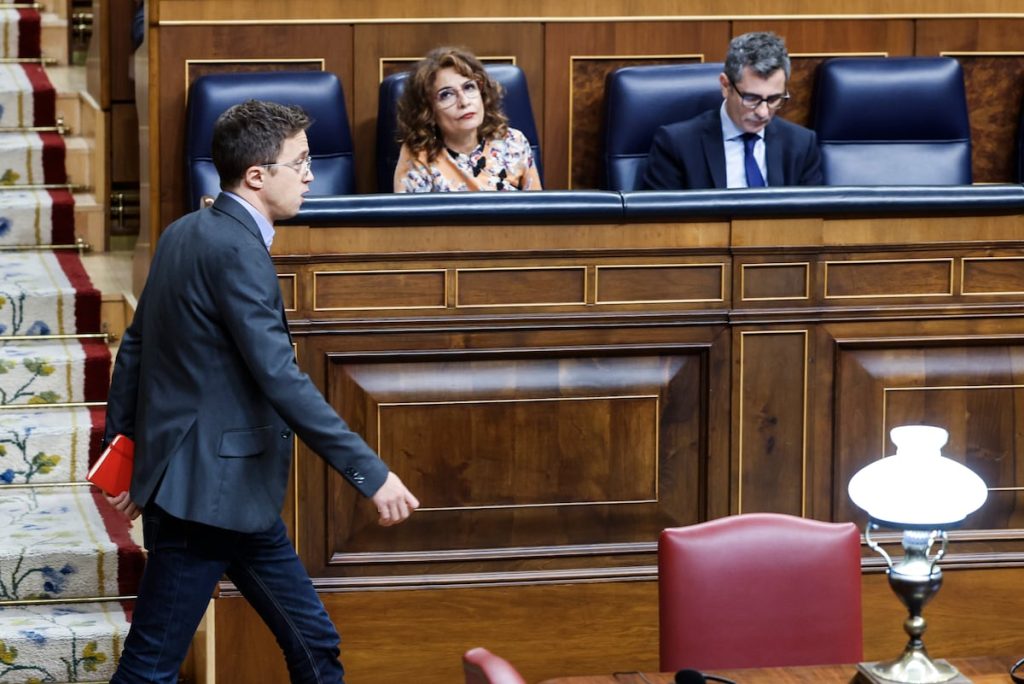After reaching agreements with the PP on two initiatives in Congress, Sumar has hardened its tone against the PSOE, distancing themselves further from their coalition partner. Following their move on Tuesday, which has irked the larger party of the coalition, the group led by Vice President Yolanda Díaz once again distanced themselves on Wednesday by being very critical in their response to the appearance of Minister of Housing, Isabel Rodríguez, an event marked in red on their calendar. After the session, parliamentary spokesperson Íñigo Errejón described Rodríguez’s intervention as a “disappointment and missed opportunity” and announced that their group will open a “reflection on the next steps to take,” although they are not seeking resignation. “We want to save this government from its disastrous management,” reproached Gala Pin, a member of the coalition, during her intervention in the chamber. Pressure on the government has also increased from the left. Podemos, questioning Sumar’s weak position, insists on conditioning their support for the Budget to a 40% reduction in rents. Tensions over housing and the announcement that the government will provide more funding to private education — something criticized on Wednesday by IU’s deputy Toni Valero — have made for two challenging days for the coalition.
In the corridors of the Congress, First Vice President María Jesús Montero, referred to the alliance between the PP and Sumar as “incomprehensible.” She tried to downplay the crisis and attributed the movement to issues within the “left-wing space” rather than the relationship between the PSOE and Sumar, alluding to a dispute with Podemos over certain issues. In Tuesday’s session, Sumar agreed to abstain on the Popular Party’s bill to give Congress the final say on defense missions abroad and the shipment of weapons in exchange for the conservatives’ approval of their own law to curb abuses in mortgage clauses. Errejón emphasized the importance of broad agreements and dismissed criticism by stating that achieving them demonstrates a “legislature for the long term.”
The debate becomes heated as Sumar aims to make housing a central issue this term, despite strong disagreements with the PSOE on the matter. While not having direct jurisdiction in the field, Díaz’s party aims to pressure for market intervention to lower prices. Within their proposals, Ibáñez suggested limiting purchases exclusively to individuals. The tension increased during Rodríguez’s speech, where she challenged Sumar to choose between supporting the government or the opposition. Podemos, in constant conflict with Sumar, reiterated its stance to support the 2025 Budgets while demanding a 40% rent reduction. The party accuses Rodríguez of “working for rentiers” and pursuing policies “indistinguishable” from the PP. The ongoing consultation with their members aims to strengthen their negotiation position and they remain firm on their demands.
The tone of the debate escalated further as Belarra referenced Rodríguez’s three properties, leading to a tense response from the Minister. The exchange sparked by references to property ownership — including mention of Iglesias and Montero’s chalé de Galapagar — highlighted the personal nature of the disagreements. Iglesias weighed in on the issue, urging for a more civil debate and drawing parallels to the harassment faced by his family previously. The verbal clashes between the parties reflect the growing tensions within the coalition and underline the challenges facing the government moving forward. The public displays of discord and differing priorities are indicative of the strains within the left-wing space and the complexities of governing with multiple factions. As the various parties within the coalition navigate their diverging interests and seek to influence policy decisions, the future of the government’s stability remains uncertain.


